Experts show the importance of Article 146-A of the Constitution
By Oscar Pilagallo
ETCO Magazine, No. 16, September 2010
Almost seven years after the publication of a constitutional amendment that provides for special taxation criteria to prevent imbalances in competition, the text approved by parliamentarians is still awaiting regulation. It was, therefore, marked by the feeling of necessary urgency and in defiance of the waiting rhythm that, on May 10, the seminar on Competition Tax Imbalance and the Brazilian Constitution was held in Brasilia.
Almost seven years after the publication of a constitutional amendment that provides for special taxation criteria to prevent imbalances in competition, the text approved by parliamentarians is still awaiting regulation. It was, therefore, marked by the feeling of necessary urgency and in defiance of the waiting rhythm that, on May 10, the seminar on Competition Tax Imbalance and the Brazilian Constitution was held in Brasilia.
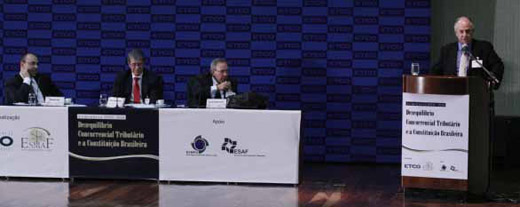
Ambassador Marcílio Marques Moreira, President of the ETCO Advisory Council, speaks during the event in Brasília. At the table, Humberto Ávila, specialist in Tax Law, André Montoro, President of ETCO, and Tércio Sampaio Ferraz Júnior, professor at USP Law School
Promoted by ETCO and the Federal Magistrates School of the First Region, the seminar brought together experts to discuss the regulation of Article 146-A. “The imbalance of competition generated by non-compliance with legal obligations has serious repercussions on the Brazilian economy,” said André Franco Montoro Filho, ETCO's Executive President, at the opening of the works.
Published on December 19, 2003, Article 146-A, resulting from Constitutional Amendment 42, which is at the center of the debate, says the following: “Complementary Law may establish special taxation criteria, with the objective of preventing competition imbalances , without prejudice to the Union's competence, by law, to establish norms with the same objective ”.
Tax experts identify in this short text a rule and a principle. The rule is explicit: it is an authorization to establish special criteria for taxation. But there is also an underlying principle, that of tax neutrality, that is, the principle that taxes should not cause harmful effects to free competition.
The fact that the article has not yet been regulated does not mean, however, that it has no effect. For Rafael Favetti, Executive Secretary of the Ministry of Justice, who represented Minister Luiz Paulo Barreto at the event, despite the lack of regulation, the article in question already weighs on judicial decisions. "The mere existence of the amendment has a natural force that radiates to judges throughout Brazil," he said. “This article, even without the regulations, means the following: 'Magistrate, when interpreting any tax situation, it is also necessary to take into account the issue of competition'.”
Favetti's opinion is shared by Sampaio Ferraz Junior, a professor at USP Law School. "On the legal level, the mere existence of Article 146-A creates a hypothesis of argument to be used in taxation," he said. Sampaio Ferraz cited as an example a decision by the Federal Supreme Court on the case of American Virginia Tobbaco, which requested preliminary measures to continue operating after being closed by the IRS for not paying taxes. The STF understood that the cigarette manufacturer should really be closed, since the practice unbalanced competition.
Taxes have a strong impact on the market. Hamilton Dias de Souza, a lawyer specializing in Tax Law and an ETCO advisor, took a random example - that of the soap industry - to demonstrate the weight of just one tax, the ICMS with an 18% rate on the profit margin. If the obligation is not paid (for any reason, including tax evasion), the profit of the favored company will be 388% higher than that obtained by the competitor who pays the full tax.
For Souza, however, article 146-A does not address issues between companies. "The protected property is public, not private," he said. “When we talk about the market, we are talking about the market as national heritage”, that is, the market as a necessary environment for the exercise of free enterprise, a foundation of the Brazilian economic order, in the terms expressed in the Constitution.
The observation was endorsed by Marcílio Marques Moreira, former Minister of Finance and president of the ETCO Advisory Council. Quoting Raghuram Rajan and Luigi Zingales, economists at the University of Chicago and authors of the book Saving Capitalism from Capitalists, Marques Moreira said that “fair market competition is a public good because it allows for innovation, efficiency, work and, therefore, , must be protected by the State ”. The former minister emphasized that such behavior involves ethics, in line with the thinker Nicolau Maquiavel (1469-1527), who establishes a close link between civic morality and healthy political life. Marques Moreira recalled what the Florentine said in Discourses on the first decade of Tito Lívio: “As good customs, to maintain themselves, they demand laws, so also laws, to be obeyed, they demand good customs”.
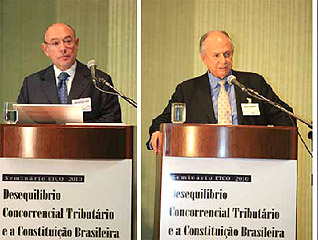
Hamilton Dias de Souza, specialist in Tax Law; Ambassador Marcílio Marques Moreira
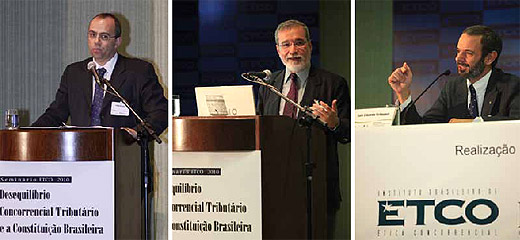
Humberto Ávila, specialist in Tax Law; Everardo Maciel, former Secretary of Federal Revenue and Luis Eduardo Schoueri, professor of Tax Law at the Faculty of Law of the University of São Paulo give a lecture during the seminar

André Montoro, President of ETCO; Otacílio Cartaxo, Secretary of Federal Revenue and Luiz Fux, Minister of the Superior Court of Justice (STJ), speak to the participants in the seminar on Tax Competition Imbalance and the Brazilian Constitution
In the same pitch, André Franco Montoro Filho affirmed that tolerance with unbalanced competition “benefits the transgressor, harming those who comply with the law”. For him, if the damage to competition is not combated, the message that will be given to entrepreneurs is that misconduct is the best way to earn money. “This type of behavior attracts opportunists and drives away those who want to invest in production, which are the ones who generate growth.” When dimensioning the problem, the ETCO Executive President recalled that what distinguishes Brazil is not only the high tax burden, but especially the high proportion of indirect taxes. Montoro estimates that 70% of taxes in Brazil are indirect, that is, taxes on production, in addition to contributions on wages. "I believe that Brazil is the country that has the highest indirect tax burden in the world - and it is exactly this type of tax that gives the tax evader a huge competitive advantage."
To curb evasion and other crimes that unbalance competition, Luiz Fux, Minister of the Superior Court of Justice, defended preventive action. He recalled that there is in Italian law, in the chapter on competition, a device that allows action before the violation, the so-called injunctive relief. "The state cannot act only repressively," he said. Recognizing that tax issues are complex and intricate, Fux recommended, in line with the objective of defending competition expressed in Article 146-A, that courts should make more frequent use of the figure of the amicus curiae, the “friend of the court”, or that is, the person or entity that, aware of the cause in question and distant from the conflicting interests, can assist the magistrate in extremely specialized matters. He also affirmed that, as a member of the STJ, he even determined the intervention of Cade (Administrative Council for Economic Defense) as amicus curiae.
For Luis Eduardo Schoueri, professor of Tax Law at USP Law School, the “friend of the court” will be fundamental in the assessment of cases in the light of article 146-A. "We are going to ask those who understand whether competition is being affected or not," he said. This is because, for him, “the existence of a tax advantage will not necessarily imply a predatory price”. The opposite may even happen, he argued. A certain tax immunity, for example, can make an economic agent viable, thus increasing competition. "We will have to learn to advocate again," he told his peers, noting that lawyers are not used to producing evidence, necessary to verify whether, in each case, the market has been affected - hence the importance of Amicus curiae.
Schoueri's opinion found an echo in the speech of Humberto Ávila, a specialist in Tax Law. Ávila considered that if, in a given universe of taxpayers of the same tax, two of them do not pay, the solution is not to change the taxation because of that minority, but only to make inspection more efficient. "But if this non-compliance is so fragmented that there is a practical administrative impossibility of knowing who is evading, then we can make everyone's regime different," he said. For him, “the assumption of the imbalance is that it is intense and fragmented, because otherwise it does not affect the competition”.
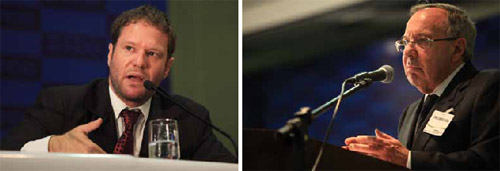
Rafael Favetti, Executive Secretary of the Ministry of Justice and Tércio Sampaio Ferraz, professor at USP Law School
In this direction, Ávila believes that one of the great contributions of the complementary law will be to standardize and predict the tax substitution mechanism. According to this mechanism, taxes spread over a productive chain (multi-phase) are collected at once, as if it were just a tax (single-phase). States make this tax substitution, but, says Ávila, each one does it in their own way. "There are no general rules," he said. "Therefore, I see the complementary law in order to ensure predictability in those normative spheres in which there is a continuous and systematic lack of uniform application of tax legislation."
For Everardo Maciel, former Secretary of Federal Revenue and ETCO advisor, although tax substitution can be an instrument to prevent competitive imbalances, it presents a weakness, which is the presumption of margins. “This presumption stems from research that intends to calculate a margin differentiated by product. But it is a false assumption because it is practically impossible to measure these margins effectively. ” And even if, hypothetically, this were possible, argues Maciel, one would know "what happened yesterday, and taxation informs what will be happening tomorrow". For him, the only alternative would be to consider the tax substitution as an anticipation, to be eventually offset later. The seminar held by ETCO promoted a real exegesis on the text of article 146-A. There is now a lack of regulation, which is more and more urgent because competitive imbalances due to tax factors are growing at the same rate as elision, tax evasion and tax evasion.
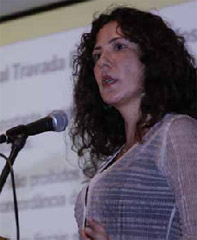
Mariana Tavares de Araújo, Secretary
of Economic Law, during a lecture
The role of Cade and the Federal Revenue Service
Government representatives present at the Seminar Competitive Tax Disequilibrium and the Brazilian Constitution, promoted by ETCO, spoke about limitations and initiatives of the State's action in the defense of the balance of competition.
Mariana Tavares de Araújo, at the head of the Economic Law Secretariat, a body linked to the Ministry of Justice, acknowledged that Cade, an autarchy in the same portfolio, can do little in some cases. Cade, for example, has no competence to restrain state incentives that may threaten the competitive balance. "Cade can comment on distortions in competition, generated by tax incentives, but in view of the preservation of the federal pact, it cannot impose sanctions on states," he said. She has recommended to companies that feel harmed by these practices that they knock on another door: “The effective ways to face these measures that distort competition all pass through the Judiciary”.
The most that the autarchy can do, according to the secretary, would be to go to court, through the Public Ministry, if its analysis identified damage to the competition. What, then, is the main role that the Brazilian competition defense system could play? For Mariana Tavares de Araújo, the role is educational. "I hope you will agree with me that there is a role in spreading the culture of competition, which, in the medium and long term, is as or more important than the application of a sanction."
Otacílio Cartaxo, Secretary of the Federal Revenue Service, defended the action of the governing body. "The Federal Revenue, through the isonomic application of tax legislation, contributes to providing competitive balance between companies," he said. In practice, to achieve this goal, the IRS has introduced two systems aimed at controlling the production of cigarettes and beverages, sectors with a high tax burden. This is Scorpios, which counts the cigarette units produced, and Sicobe, which measures the flow of liters of drinks.
Car taxo also mentioned the recent creation of two Federal Revenue offices, in São Paulo and Rio de Janeiro, aimed at the largest taxpayers. "Often tax evasion takes complex forms and is crossdressed by corporate adjustments and agreements that have no other purpose than the evasion of the tax," he said. To distinguish effective mergers from fraudulent simulations, the two police stations have a highly specialized technical staff, said Cartaxo.
Also with the objective of combating tax evasion, said Cartaxo, the SPED (Public Digital Bookkeeping System) was created, having as one of its components the NF-e, an initiative with the support of ETCO. At the event in Brasília, ETCO received from Encat (National Meeting of State Tax Coordinators and Administrators) a prize in honor of the mark of 1 billion electronic invoices issued in the country that, in addition to collaborating to combat tax evasion, avoided, with the saved paper, the felling of more than 400 thousand trees.
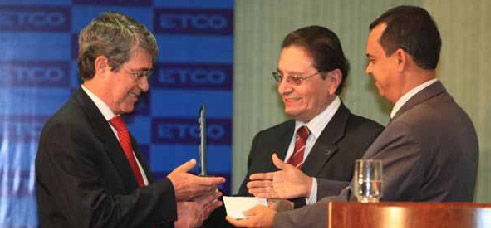
André Montoro, President of ETCO, receives from Otacílio Cartaxo, Secretary of Federal Revenue, and Eudaldo Almeida Jesus, General Coordinator of Encat, award for the mark of 1 billion electronic invoices issued in the country



